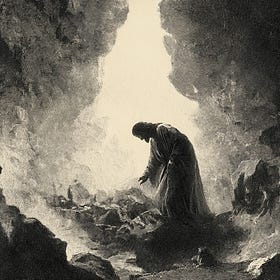The gospel won’t carry your cargo.
A spiritual antipasto.
The gospel is not our idea. It never was. And thank God for that.
The gospel is God’s good news, His message about His Son. Not ours about Him; His about Him, His about Himself. It’s not something we invented or reasoned toward. It’s something we are swept into.
We are so tempted to chisel the gospel down to what makes “better” sense to us. We peel it back with tools of logic and criticism, until we’ve whittled Christ into a figure we can manage: “the historical Jesus”—a reflection, not of God, but of ourselves. This will always end in self-projection: a Jesus who conveniently agrees with our worldview, our expectations, our cultural norms. And why wouldn’t it when we dislocate Jesus Christ from the revelatory authority of the Triune God?
In the end, we have a gospel with no power, only plausibility. A Jesus we can agree with, not fall before.
But the gospel does not emerge from our scrutiny. It descends from above, shattering our categories. The gospel is not deduced. It is revealed. When we attempt to get behind the gospel text, bypassing the apostolic witness, we lose the living Christ and are left with a dead construct—a historical relic rather than the risen Lord who confronts and re-forms us.
You cannot access who Jesus really is through critical method alone. He must give Himself to be known. The gospel is only truly known when the Spirit of Christ draws us inside the mind of Christ, into His communion with the Father.
This gospel doesn’t begin with us and our beliefs and agendas and identities. It begins with the Father—before time, before space, before the foundations of anything. And it centers on His eternal Son, Jesus Christ, who stepped into time and space, into our dust and our death, carrying with Him the fullness of divine life and love.
That gospel descended—actually descended—into human history, not as a system of ideas, but as a Person. Not as a manual for better living, but as the Life of God Made Flesh. It doesn’t invite us to align with an ideology. The gospel is to be caught up into a communion that existed long before we ever showed up, long before we ever crafted an ideology, long before we ever conceived of a critical method of understanding. The gospel is an invitation into the eternal love that exists between the Father, the Son, and the Holy Spirit.
That’s the foundation we’re standing on. That’s the faith once and for all delivered to the saints.
And yet, we’d rather have some other pathetically shallow foundation (relatively speaking) to build everything upon. Our politics, our followers, our pain. Our careers, our causes, our comforts. Our genders, our bodies, our wounds. We smuggle our agendas and grievances and histories into the gospel, and then we wonder why it no longer feels like good news. But the gospel isn’t for carrying our cargo—our self-made frameworks, our ideologies, our attempts to baptize our politics, our self-expression, our spin. It’s not meant to. It’s not ours.
No!
The gospel is the Father’s joy about His Son, in the power of the Spirit, shared with us. And that joy is our starting point. Our only point. Everything else is derivative. Every other conversation, decision, belief, and identity is downstream from that.
And this gospel? It’s not static like a philosophical proposition. It moves. It moves through time and space, through flesh and blood, through history and death and resurrection. It moves through the actual body of Jesus—the Son of David—into the grave, into hell, and then into glory. It moves through the Spirit of holiness, who raised Jesus from the dead and now lives in us.
And because that same Spirit—the Spirit of the Son, the Spirit of Christ—has taken up residence in us, we now share in the Son’s very own knowledge of the Father. Not merely ideas or information or speculations about God. But communion. Real communion. We don’t stand on the outside looking in, observing, collecting data, and calling it “knowledge of God.” We’ve been pulled into the inside. Into the Triune life. Into Jesus’ own relationship with the Father. The Son shares that with us. Through the Spirit.
That’s how we know God—not by explanation, speculation, or postulation, but by participation. Not by theory but by union.
And how did all of this begin?
With God. With the Father. With divine initiative. Not with us figuring anything out.
We didn’t reason our way to the incarnation, the crucifixion, or the resurrection. We couldn’t. God knew we couldn’t know Him by our own cleverness. So He gave Himself to be known by us—by giving Himself to us.
That’s why the gospel doesn’t rest in plausible arguments or persuasive speech. It rests entirely in the power of God. Because what we need isn’t information. We need transformation. We need participation. We need communion, the only true way to know God.
And so Jesus—the Eternal Son, the image of the invisible God—descended into our humanity. And not just the nice parts. The deepest, darkest corners. The most broken places. The wounds we can’t name. He entered all of that. And healed it from the inside.
Then the Spirit raised Him from the grave—the place we fear the most, the place that holds our endings—and revealed who Jesus truly is: not just a Nazarene, not just a teacher, not just a prophet, but the co-eternal, enthroned Son of God. And then that same Spirit was poured into us.
And now we, impossibly, unbelievably, breathtakingly—we live in that relationship. In the Son. Through the Spirit. With the Father.
This is the gospel. Not our best thoughts about God. But God’s best gift to us: Himself.
Welcome to communion.
Because you are His sons, God sent the Spirit of His Son into our hearts, the Spirit who calls out, “Abba, Father.” — Galatians 4:6 What we have received is not the spirit of the world, but the Spirit who is from God, so that we may understand what God has freely given us. — 1 Corinthians 2:12 For what we preach is not ourselves, but Jesus Christ as Lord. ...For God, who said, ‘Let light shine out of darkness,’ made His light shine in our hearts to give us the light of the knowledge of God’s glory displayed in the face of Christ. — 2 Corinthians 4:5–6 Christ sent me to preach the gospel—not with wisdom. Why? Lest the cross of Christ be emptied of its power. For the word of the cross is foolish—it is foolish to those who are perishing—but to us who are being saved it is the power of God (not the wisdom of men). Where is the person who is wise? Where is the person who can debate this age? In the wisdom of God, the world would not know God through its wisdom. Instead, it pleased God through the folly of what we preach to save those who believe. We preach Christ crucified. — 1 Corinthians 1:17–23
This spiritual antipasto has an accompanying call to worship:
Not our gospel.
If the gospel really is God’s own good news—not ours—then everything must begin and end there. This call to worship puts that conviction into prayerful motion, inviting us to stand in the truth of what the Father has declared concerning His Son, by the Spirit.



